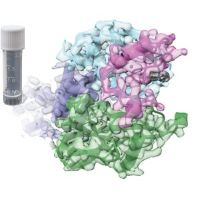Specification
| Description | Recombinant protein from the full-length sequence of homo sapiens arachidonate 15-lipoxygenase (ALOX15) (NM_001140). |
| Organism | Homo sapiens (Human) |
| Expression Host | Human Cells |
| Tag Info | His or DYKDDDDK. Please contact us if you need further information or require specific designed tag. |
| Purity | Greater than 90% by SDS-PAGE gel |
| Uniprot ID | P16050 |
| Entry Name | LOX15_HUMAN |
| Gene Names | ALOX15 LOG15 |
| Alternative Gene Names | LOG15 |
| Alternative Protein Names | Polyunsaturated fatty acid lipoxygenase ALOX15 (12/15-lipoxygenase) (Arachidonate 12-lipoxygenase, leukocyte-type) (12-LOX) (EC 1.13.11.31) (Arachidonate 15-lipoxygenase) (15-LOX) (15-LOX-1) (EC 1.13.11.33) (Arachidonate omega-6 lipoxygenase) (Hepoxilin A3 synthase Alox15) (EC 1.13.11.-) (Linoleate 13S-lipoxygenase) (EC 1.13.11.12) |
| Application | Antigens, Western, ELISA and other in vitro binding or in vivo functional assays, and protein-protein interaction studies; For research & development use only! |
| Buffer | Purified protein formulated in a sterile solution of PBS buffer, pH7.2, without any preservatives |
| Endotoxin | Endotoxin level is < 0.1 ng/µg of protein (<1EU /µg) |
| Length | 662 |
| Molecular Weight(Da) | 74804 |
| Protein Sequence | (The sequence of expressed protein may have some variation from the sequence shown below. Please contact us for the exact sequence.) MGLYRIRVSTGASLYAGSNNQVQLWLVGQHGEAALGKRLWPARGKETELKVEVPEYLGPLLFVKLRKRHLLKDDAWFCNWISVQGPGAGDEVRFPCYRWVEGNGVLSLPEGTGRTVGEDPQGLFQKHREEELEERRKLYRWGNWKDGLILNMAGAKLYDLPVDERFLEDKRVDFEVSLAKGLADLAIKDSLNVLTCWKDLDDFNRIFWCGQSKLAERVRDSWKEDALFGYQFLNGANPVVLRRSAHLPARLVFPPGMEELQAQLEKELEGGTLFEADFSLLDGIKANVILCSQQHLAAPLVMLKLQPDGKLLPMVIQLQLPRTGSPPPPLFLPTDPPMAWLLAKCWVRSSDFQLHELQSHLLRGHLMAEVIVVATMRCLPSIHPIFKLIIPHLRYTLEINVRARTGLVSDMGIFDQIMSTGGGGHVQLLKQAGAFLTYSSFCPPDDLADRGLLGVKSSFYAQDALRLWEIIYRYVEGIVSLHYKTDVAVKDDPELQTWCREITEIGLQGAQDRGFPVSLQARDQVCHFVTMCIFTCTGQHASVHLGQLDWYSWVPNAPCTMRLPPPTTKDATLETVMATLPNFHQASLQMSITWQLGRRQPVMVAVGQHEEEYFSGPEPKAVLKKFREELAALDKEIEIRNAKLDMPYEYLRPSVVENSVAI |
Background
| Function | FUNCTION: Non-heme iron-containing dioxygenase that catalyzes the stereo-specific peroxidation of free and esterified polyunsaturated fatty acids generating a spectrum of bioactive lipid mediators (PubMed:1944593, PubMed:8334154, PubMed:17052953, PubMed:24282679, PubMed:25293588, PubMed:32404334). It inserts peroxyl groups at C12 or C15 of arachidonate ((5Z,8Z,11Z,14Z)-eicosatetraenoate) producing both 12-hydroperoxyeicosatetraenoate/12-HPETE and 15-hydroperoxyeicosatetraenoate/15-HPETE (PubMed:1944593, PubMed:8334154, PubMed:17052953, PubMed:24282679). It may then act on 12-HPETE to produce hepoxilins, which may show proinflammatory properties (By similarity). Can also peroxidize linoleate ((9Z,12Z)-octadecadienoate) to 13-hydroperoxyoctadecadienoate/13-HPODE (PubMed:8334154). May participate in the sequential oxidations of DHA ((4Z,7Z,10Z,13Z,16Z,19Z)-docosahexaenoate) to generate specialized pro-resolving mediators (SPMs)like resolvin D5 ((7S,17S)-diHPDHA) and (7S,14S)-diHPDHA, that actively downregulate the immune response and have anti-aggregation properties with platelets (PubMed:32404334). Can convert epoxy fatty acids to hydroperoxy-epoxides derivatives followed by an intramolecular nucleophilic substitution leading to the formation of monocyclic endoperoxides (PubMed:25293588). Plays an important role during the maintenance of self-tolerance by peroxidizing membrane-bound phosphatidylethanolamine which can then signal the sorting process for clearance of apoptotic cells during inflammation and prevent an autoimmune response. In addition to its role in the immune and inflammatory responses, this enzyme may play a role in epithelial wound healing in the cornea through production of lipoxin A4 (LXA(4)) and docosahexaenoic acid-derived neuroprotectin D1 (NPD1; 10R,17S-HDHA), both lipid autacoids exhibit anti-inflammatory and neuroprotective properties. Furthermore, it may regulate actin polymerization which is crucial for several biological processes such as the phagocytosis of apoptotic cells. It is also implicated in the generation of endogenous ligands for peroxisome proliferator activated receptor (PPAR-gamma), hence modulating macrophage development and function. It may also exert a negative effect on skeletal development by regulating bone mass through this pathway. As well as participates in ER stress and downstream inflammation in adipocytes, pancreatic islets, and liver (By similarity). Finally, it is also involved in the cellular response to IL13/interleukin-13 (PubMed:21831839). {ECO:0000250|UniProtKB:P39654, ECO:0000250|UniProtKB:Q02759, ECO:0000269|PubMed:17052953, ECO:0000269|PubMed:1944593, ECO:0000269|PubMed:21831839, ECO:0000269|PubMed:24282679, ECO:0000269|PubMed:25293588, ECO:0000269|PubMed:32404334, ECO:0000269|PubMed:8334154}. |
| Pathway | Lipid metabolism; hydroperoxy eicosatetraenoic acid biosynthesis. |
| Protein Families | Lipoxygenase family |
| Tissue Specificity | Detected in monocytes and eosinophils (at protein level). Expressed in airway epithelial cells. {ECO:0000269|PubMed:21831839, ECO:0000269|PubMed:9414270}. |
QC Data
| Note | Please contact us for QC Data |
| Product Image (Reference Only) |  |

